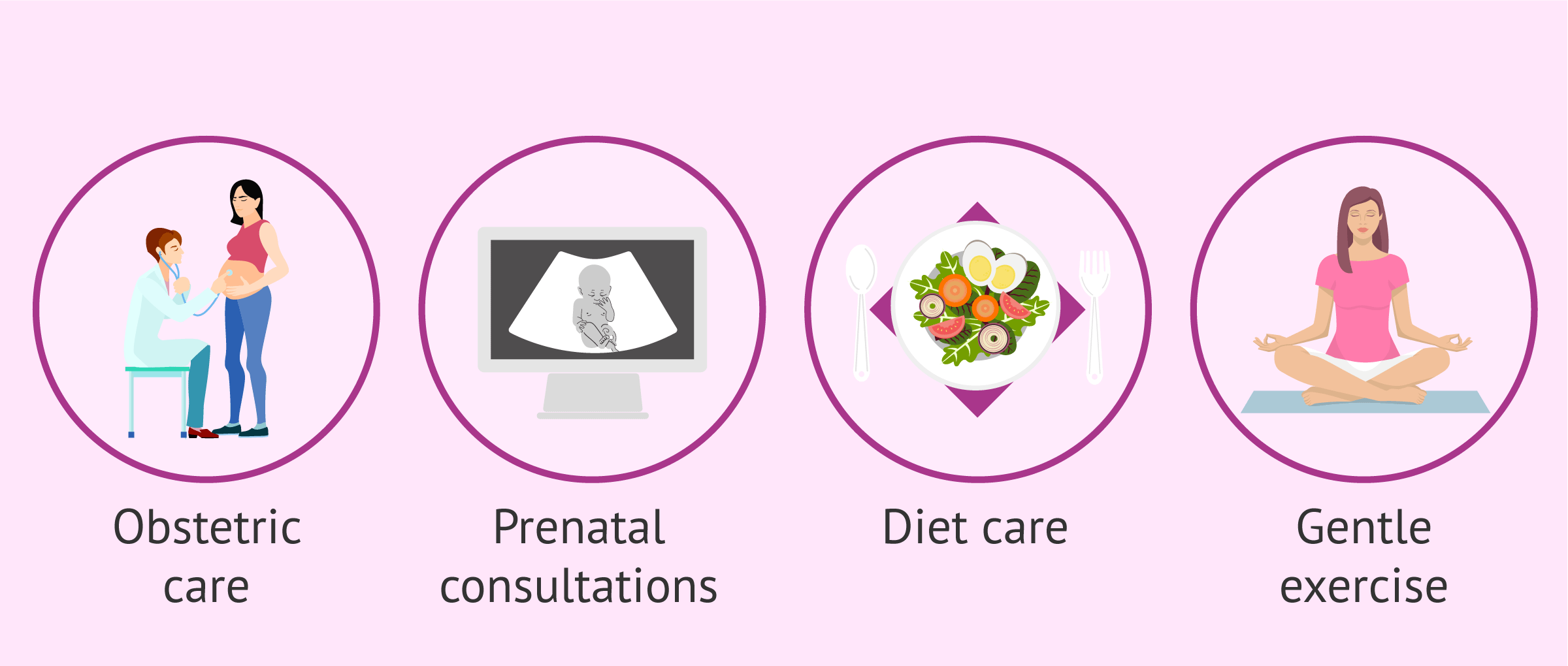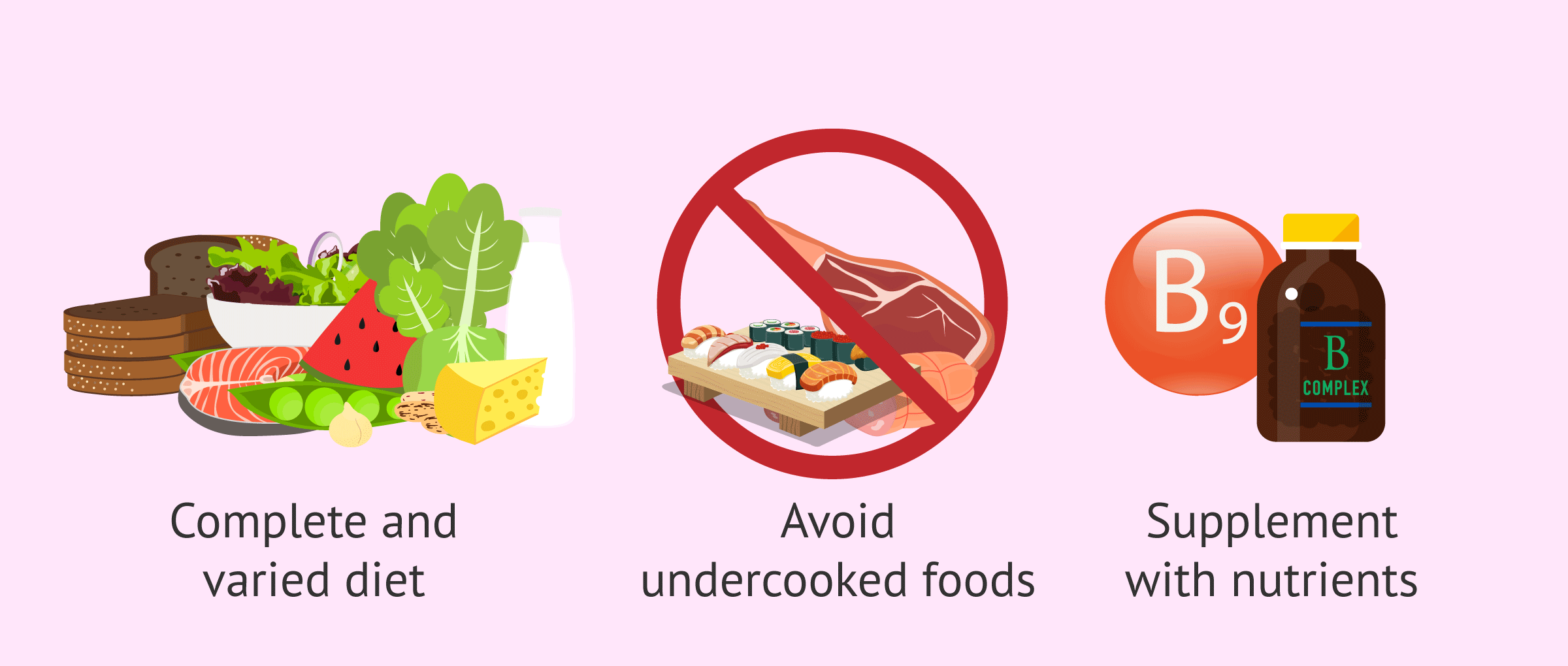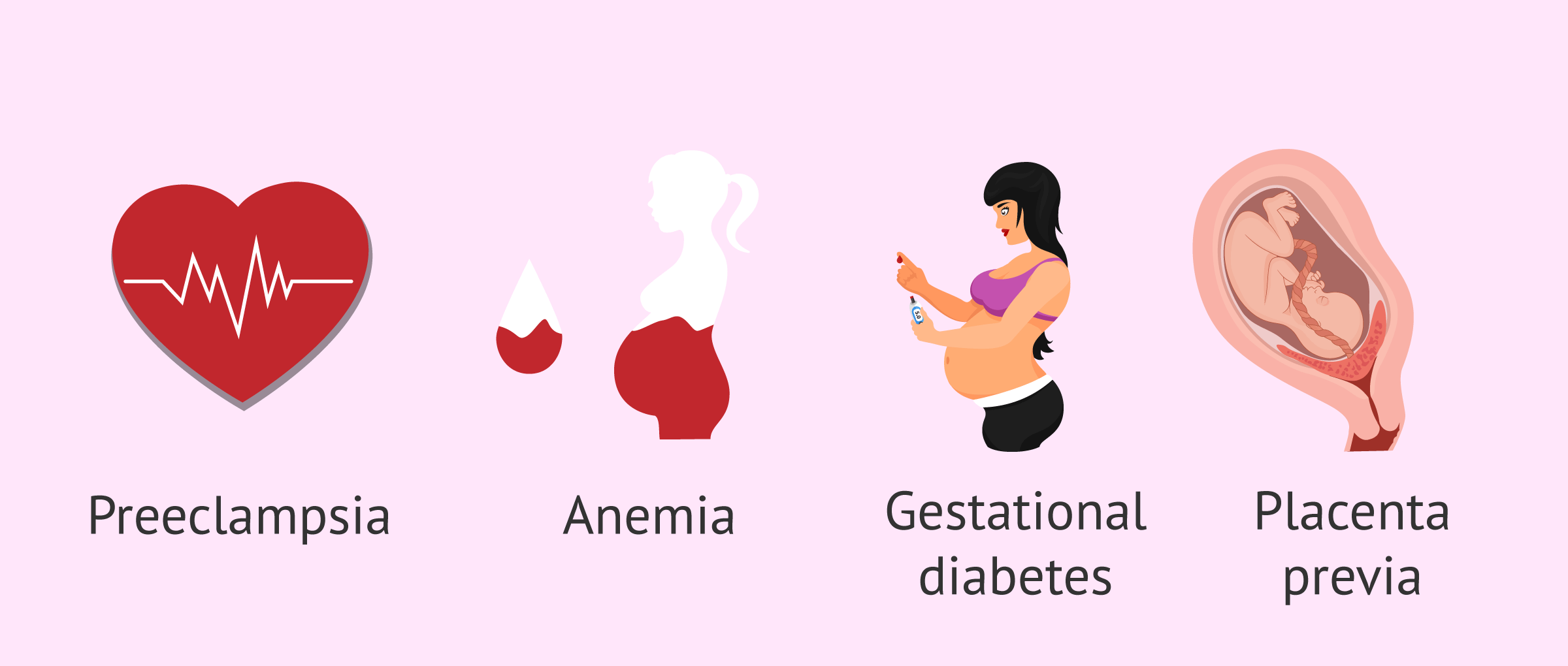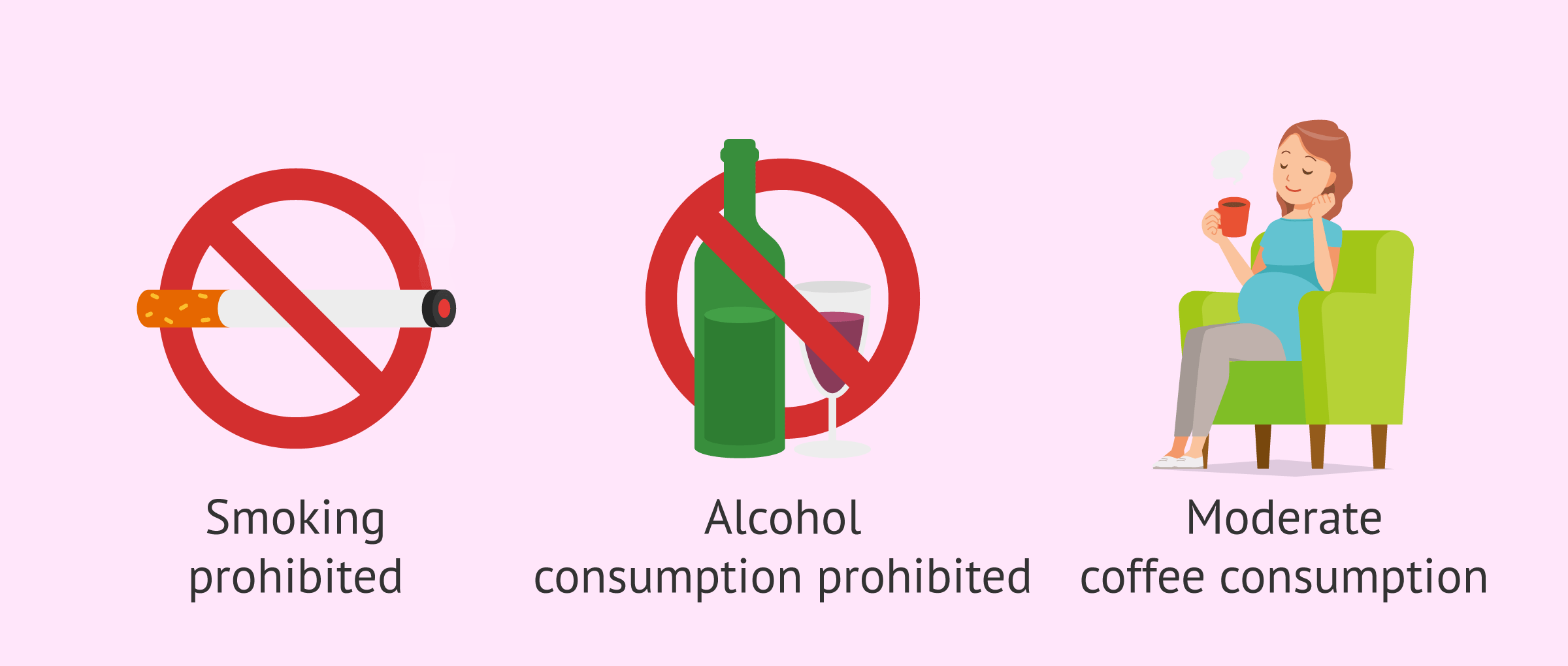The mother's health prior to pregnancy, her eating and drinking habits such as tobacco and alcohol, pharmacological treatments and exposures to environmental or workplace toxins are very important factors that can influence the development of the pregnancy and the health of the fetus.
For this reason, women should start taking care of themselves as soon as they discover they are pregnant, or even earlier if the pregnancy is planned.
The gynecologist and/or midwife will inform the pregnant woman about these special cares, as well as the medical check-ups that she should have during the entire pregnancy.
Provided below is an index with the 7 points we are going to expand on in this article.
- 1.
- 1.1.
- 1.2.
- 1.3.
- 1.4.
- 1.5.
- 1.6.
- 2.
- 2.1.
- 2.2.
- 3.
- 4.
- 4.1.
- 4.2.
- 4.3.
- 4.4.
- 4.5.
- 4.6.
- 5.
- 6.
- 7.
Pregnancy care
Once the pregnancy test is positive, the pregnant woman should go to her family doctor, who may refer her to the obstetrician and request a series of tests to start monitoring the pregnancy.
On the other hand, it is advisable for pregnant women to start taking care of their diet, doing gentle or moderate exercise, and having good personal hygiene.
In the case of first-time pregnant women, the specialist will also be able to recommend special care for their day-to-day life, as well as the appropriate vaccinations to avoid certain risks for them and the baby they are expecting.
Medical and obstetric care
Throughout the pregnancy and especially in the first trimester, the woman will have to undergo several medical tests to check that the baby is healthy and that the pregnancy is progressing properly.
The basic tests usually included in prenatal monitoring in a normal pregnancy, that is, a low-risk pregnancy with a good prognosis, are the following:
- Periodic recording of weight and blood pressure.
- Examination of the abdomen, abdomen and cervix.
- Blood and urine tests.
- Ultrasounds to see the baby's growth, the development of all its organs and to calculate the expected delivery date (EDD).
- Fetal echocardiography to check the baby's heart function.
- Combined first trimester screening to assess the risk of Down syndrome and other chromosomal defects, as well as major congenital heart defects.
- O'sullivan test or glucose test to detect gestational diabetes.
You will find all this expanded information for each trimester of pregnancy in the following article: Prenatal pregnancy control: tests, analyses, and ultrasound scans.
Diet during pregnancy
The pregnant woman's diet, in general, should be complete and varied, with high consumption of fruits, vegetables, bread, rice, pasta, legumes, and whole wheat bread.
A woman's weight gain during pregnancy should be between 11 and 14 kg, so it is recommended to cook all foods grilled, baked, boiled, or steamed.
It is also advisable to avoid foods high in sugars and animal fats, as well as sausages, meats, and fish that have been undercooked or not cooked at all in order to avoid toxoplasmosis and listeriosis.
Finally, the diet of pregnant women should be supplemented or be rich in certain nutrients to promote the proper development of the fetus, which we discuss below:
- Folic acid
- folic acid supplements before and during early pregnancy help prevent neural tube defects, such as anencephaly or spina bifida, as well as heart defects in the baby.
- Iodine
- lack of iodine in women can cause hypothyroidism or mental retardation in the fetus, so the regular use of iodized salt in food is recommended.
- Calcium and phosphorus
- are the minerals that will form the bones and teeth of the future baby. Therefore, pregnant women should consume foods rich in calcium to avoid decalcifications, such as milk, yogurts, soy derivatives, fish with bones, nuts, etc.
- Iron
- iron requirements increase during gestation due to increased blood volume, synthesis of fetal and placental tissues, and the formation of iron stores in the fetus for later use in lactation. Iron deficiency can cause iron deficiency anemia in the mother and also in the baby during infancy.
To be properly informed about the foods and vitamins you need during pregnancy, we encourage you to continue reading this article: Nutrition in pregnancy.
Oral health
Dental care is very important during pregnancy since cavities and gingivitis are more frequent during this stage.
In pregnancy, dental plaque develops more rapidly and gums may become inflamed, infected, or bleed.
Therefore, it is recommended that women visit the dentist at the beginning of pregnancy, have their mouths cleaned, and brush their teeth after every meal throughout their pregnancy.
Body care
During pregnancy, a woman's body undergoes many changes, the most obvious of which is the growth of the belly. This causes the skin to stretch and the famous "stretch marks" can appear pregnancy stretch marks.
To avoid stretch marks, women should drink plenty of water and moisturize their skin well with creams and body oils.
A very important aspect during pregnancy is to prepare the muscles of the perineum for the moment of delivery, in order to avoid tearing. Physiotherapists recommend daily massage of this area with moisturizing oil.
To take care of personal hygiene, a daily shower is recommended for all pregnant women, as increased vaginal sweating and discharge are normal.
Finally, it is not advisable to wear shoes with very high heels or very flat, or stockings and socks that produce local compression in the legs, as this would increase the risk of varicose veins.
Vaccines
At the first prenatal visit, the physician should review the woman's historical immunization schedule to see if it is in order.
It is important to note that pregnant women can only be vaccinated with inactivated viruses, bacterial vaccines, and toxoids, as in the case of diphtheria, tetanus, cholera, hepatitis, rabies, polio, etc.
In addition, in order to avoid complications in pregnancy, your doctor may prescribe a pertussis or influenza vaccine during periods when there is a higher risk of infection.
Live or attenuated virus vaccines are contraindicated during pregnancy, so it will not be possible to be vaccinated against human papillomavirus (HPV), MMR (measles-rubella-mumps), or varicella (chickenpox). These vaccines should be given before a woman becomes pregnant.
Work and travel during pregnancy
In the event that the woman works in an environment where pregnancy or maternal or fetal well-being is endangered, she must take a leave of absence during pregnancy. This is the case for jobs involving exposure to chemicals or high physical exertion.
When traveling during pregnancy, women should take a series of precautions, such as hydrating well and taking breaks every two hours.
It is possible to travel by car, train or plane until almost the last weeks of gestation. However, places with poor health services and long journeys towards the end of pregnancy should be avoided.
Health problems in pregnancy
There are a number of obstetric complications that can occur during pregnancy and endanger the life of the baby or even, in the most severe cases, the mother:
- Preeclampsia.
- Anemia
- Gestational diabetes
- Hyperemesis gravidarum
- Spontaneous abortion
- Alterations in the amniotic fluid
- Placental abruption
- Placenta previa.
- Intrauterine fetal death
In order to detect these complications early and even avoid them, it is important that the woman attends the established medical check-ups throughout her pregnancy.
Maternal diseases, as well as the substances consumed by the mother, may favor the development of some of the aforementioned alterations.
Therefore, it is very important to emphasize the following precautions to ensure that the pregnancy progresses without complications, especially if the woman already had a pre-pregnancy illness.
Tobacco, alcohol, drugs and coffee
Tobacco, alcohol, and drugs are toxic substances for pregnancy that women should avoid at all costs, as they act as teratogens and increase the likelihood of fetal damage and congenital malformations.
Congenital malformations are those anatomical, structural, functional, metabolic, or behavioral alterations that develop in the stages of embryonic development, so the child presents them from birth.
On the one hand, smoking during pregnancy leads to intrauterine growth retardation (IUGR) and risk of premature delivery, in addition to many other short- and long-term complications.
As for prenatal alcohol exposure, it is one of the most common causes of mental retardation, so all pregnant women are advised not to drink any alcohol during pregnancy and lactation.
In addition, the effects of alcohol are known to be dose-dependent, i.e., the greater the intake and exposure, the greater the effects on the infant. Thus, the most severe effects are seen in infants of alcoholic mothers.
On the other hand, cocaine, glues, or other synthetic drugs can also cause miscarriages, mental retardation, and birth defects.
Coffee and other caffeinated beverages can be harmful during pregnancy, so experts recommend only one cup of coffee or tea a day.
Diseases and medications
Pregnant women should always consult with their physician before taking any medication, including analgesics, anti-inflammatory, or antipyretic drugs.
Many of the components of the drugs can pass from maternal blood to fetal blood by crossing the placental barrier, thus affecting the baby's development.
Specifically, Misoprostol, antiepileptics, methotrexate, and retinoic acid are some drugs that can have negative effects on the fetus, such as causing miscarriages, mental retardation, and birth defects, etc.
In case the mother suffers from a chronic disease such as epilepsy, it is important to consult with the doctor before conception if it is possible to modify the medication for one that is less toxic for the fetus.
Other diseases such as diabetes mellitus, hyperandrogenism, or systemic lupus erythematosus can also cause congenital defects, a sexual reversal in the case of androgenism, and heart block or transient lupus.
If you want to learn more about this topic, you can continue reading the following article: Medications in pregnancy.
Emotional health in pregnancy
The emotional health of the pregnant woman is as important as her physical health, as it also affects the development of the fetus. Prenatal and perinatal psychologistsare available to help women cope with the emotional changes that can occur during pregnancy.
A correct emotional state is also essential before and after pregnancy. Keep in mind that the arrival of a baby changes the life of the parents and this can be difficult to assimilate.
It is important to try to avoid postpartum depression, a state of extreme anxiety and sadness that grips the mother just after giving birth and, in the most severe cases, prevents her from caring for her baby.
To achieve this, a woman should always seek help from her partner, family, and friends. However, this may not be enough and you may need therapy, a support group, or even some form of medication.
FAQs from users
How many times is it advisable to visit a prenatal visit during a pregnancy?
According to the Spanish Society of Gynecology and Obstetrics (SEGO), women with a pregnancy that progresses without complications should go to the prenatal consultation with the following periodicity:
- Up to week 36: every 4-6 weeks.
- From week 37 to week 40: every 1-2 weeks.
- After week 40: 1 to 3 times a week.
IVF pregnancy vs. natural pregnancy, is there any difference?
There exist no differences between a natural pregnancy and a pregnancy that has been achieved using reproductive technologies such as IVF. After the embryo transfer, fetal development will be the exactly the same.
Neither the risk of malformations nor the risk of miscarriage increase when using a fertility treatment. Some studies have discovered a slightly higher risk of preterm birth or low birth weight. Anyway, these complications do not seem to be directly linked to the use of fertility treatments, but with the cause of infertility: women aged 40 or older, uterine anomalies and other pathologies... This type of pregnancies must be monitored very closely.
What care should I take during pregnancy so as not to gain weight?
There will be an inevitable weight gain due to the baby's growth, but with cravings and emotional changes, it is possible to gain a few extra kilos by eating certain foods. It is important not to overindulge in sweets to avoid gestational diabetes.
Women can control their weight by maintaining a healthy and balanced diet. The doctor can provide a table of foods that can be consumed throughout the pregnancy and will keep track of the evolution of the pregnant woman's weight during check-ups. The woman should gain 11 to 14 kilos during the entire pregnancy.
Do I have to follow a special diet during pregnancy if I have gestational diabetes?
Yes, sugars (carbohydrates) should be avoided and a thorough medical control is essential throughout pregnancy in these cases. It is important to eat foods with a lot of fiber (fruits, vegetables, whole grain breads, cereals, legumes), as they are absorbed more slowly than simple carbohydrates and help blood sugar levels not to rise too quickly after meals.
The doctor or dietician will be in charge of indicating to the woman the foods she should eat and adapting them to the nutritional needs at each stage of pregnancy.
What care should be taken in high-risk pregnancy?
In a high-risk pregnancy, a series of measures should be taken, as indicated by the physician, to prevent complications as far as possible.
In general, it is important to rest and limit physical exercise, always adapting it to a particular situation. It is also necessary to attend all medical appointments, which will be more numerous than in a normal pregnancy.
Is special care needed in twin pregnancy?
Since there is a greater risk of suffering complications in multiple pregnancies, visits to the gynecologist will be more numerous and medical control over the pregnancy will be greater.
The mother's diet is very important for the babies to grow at an adequate rate and for the woman to gain the necessary weight so that low birth weight does not occur. In a twin pregnancy, the woman should gain 15 to 20 kilos.
In case there is a risk of premature delivery, the doctor would indicate absolute rest until it is time to give birth.
Recommended readings
We have talked about the possible complications that can arise in pregnancy and that can cause serious health problems for the mother or for the baby on the way. If you want more information, do not hesitate to access the following post: Complications during pregnancy.
On the other hand, you can find the diseases that may pose a risk to the mother and the fetus in the following article: Pregnancy diseases.
We make a great effort to provide you with the highest quality information.
🙏 Please share this article if you liked it. 💜💜 You help us continue!
References
Alcolea Flores, S., Mohamed Mohamed D. Guía de cuidados en el embarazo. Consejos de su matrona. Hospital Universitario de Ceuta (Dirección Territorial de Ceuta e Instituto Nacional de Gestión Sanitaria (ed.). Colección Editorial de Publicaciones del INGESA. ISBN: 978-84-351-0408-1
ningham F, MacDonald P, Gant N, et al. 4ª ed, Barcelona; pp. 201-237
Duyff, R.L. (2002). American Dietetic Association Complete Food and Nutrition Guide (2nd Ed.). Hoboken, New Jersey: John Wiley & Sons, Inc.
Obregón Yáñez LE. Primigesta de edad avanzada. Rev Obstet Ginecol Venez. 2007; 67 (3): 152-166 (View)
O’Brian B, Naber S. (1992) Nausea and vomiting during pregnancy: effects on the quality of women’s lives. Birth; 19: 138-143 (View)
Obstetricia 4ª edición. J. González Merlo. Ed. Masson. Barcelona, 2003
Prof. Mary Wingfield (2017). The Fertility Handbook: Everything You Need to Know to Maximise Your Chance of Pregnancy, Gill & Macmillan Ltd, May 29, 2017
The American Dietetic Association. (2008) Position of the American Dietetic Association: Nutrition and Lifestyle for a Healthy Pregnancy Outcome. Journal of the American Dietetic Association. 108:553-561 (View)
Tipiani Rodríguez O. ¿Es la edad materna avanzada un factor de riesgo independiente para complicaciones materno-perinatales? Rev Per Ginecol Obstet. 2006; 52 (3): 179-185 (View)
FAQs from users: 'How many times is it advisable to visit a prenatal visit during a pregnancy?', 'IVF pregnancy vs. natural pregnancy, is there any difference?', 'What care should I take during pregnancy so as not to gain weight?', 'Do I have to follow a special diet during pregnancy if I have gestational diabetes?', 'What care should be taken in high-risk pregnancy?' and 'Is special care needed in twin pregnancy?'.
Authors and contributors

More information about Cristina Algarra Goosman













Hi, I am in the beginning of my second trimester and I would like to know why I only go to the doctor once a month, I am worried that from time to time something might happen.
Hi Vanessa,
At the beginning of the second trimester, you usually have a prenatal check-up every 4- 6 weeks, this is established if there is no risk during pregnancy and therefore you do not have to carry a more exhaustive control. From week 37 onwards the frequency of monitoring increases to every week or couple of weeks.
If you notice any discomfort or think there is something wrong I recommend you go to the doctor, they will check you and make sure everything is okay. You know your body and there is nothing wrong with checking if everything is fine.
I hope I have helped you,
Best regards
Okay, but as far as I know, coca-cola also contains a toxic substance called “caffeine”. Are you telling me I should quit cola? Sorry, I can’t. I drink like 3-4 colas a day on average. I’m planning to get pregnant but do you think this could be a problem for my baby? Give me an answer, please!
Dear roXy,
The answer is yes, caffeine may have an impact on fetal development. I recommend that you drink caffeine free coke during pregnancy as you will be able to keep drinking it but it won’t have an influence on your pregnancy.
Cheers.